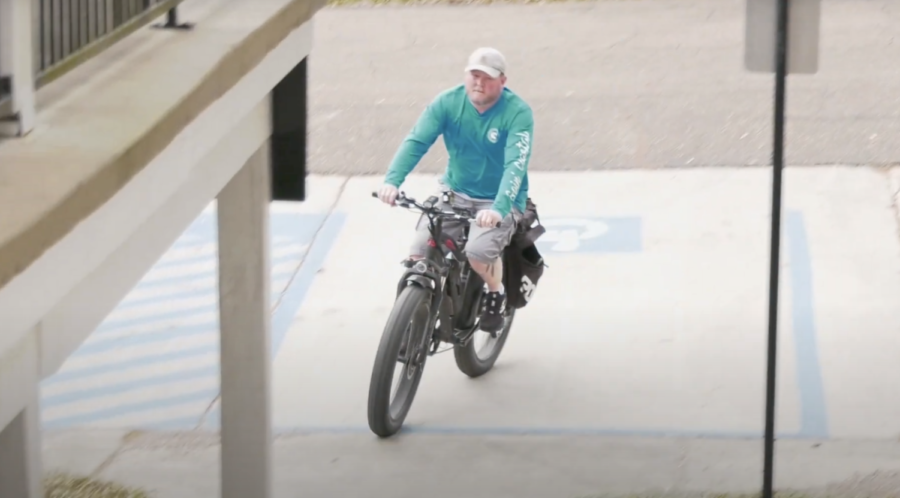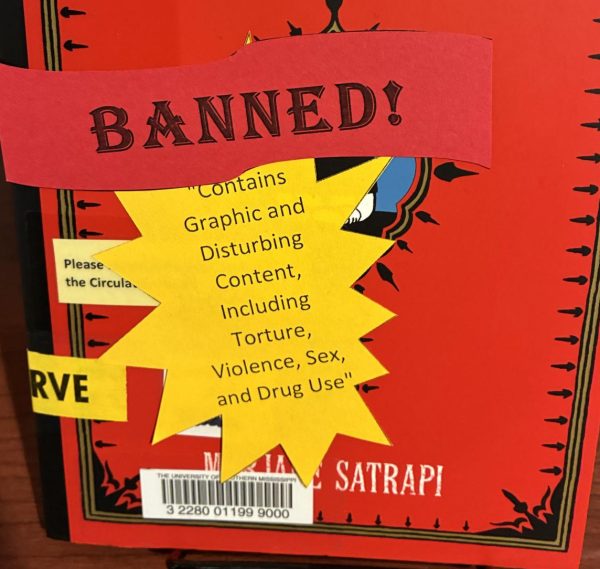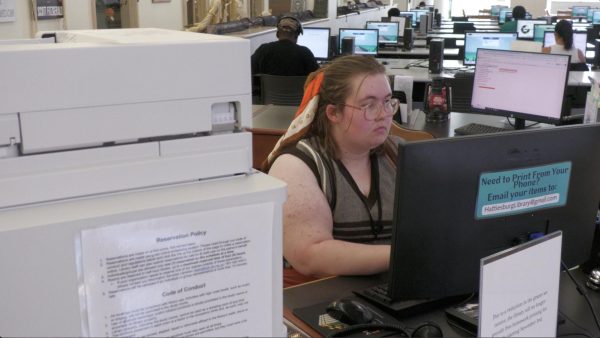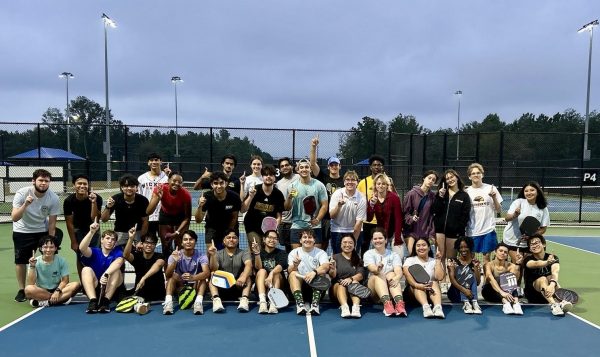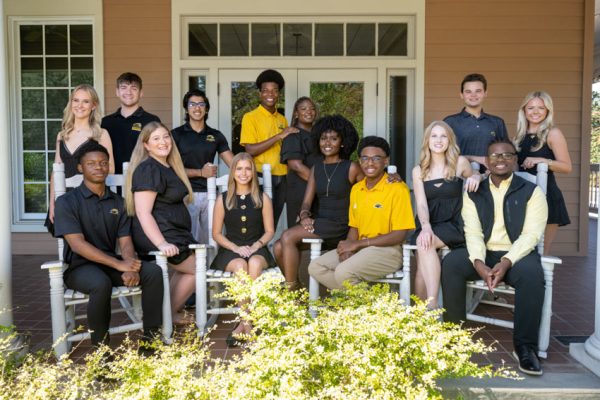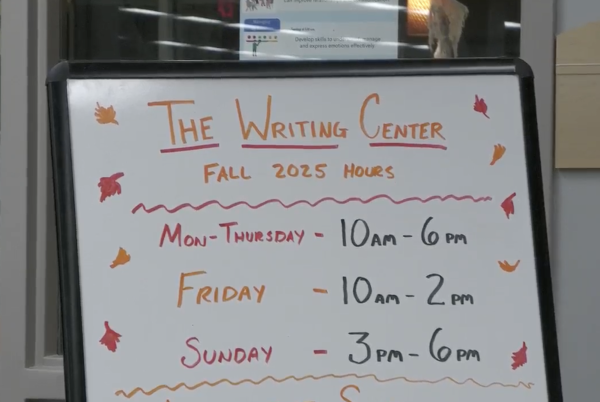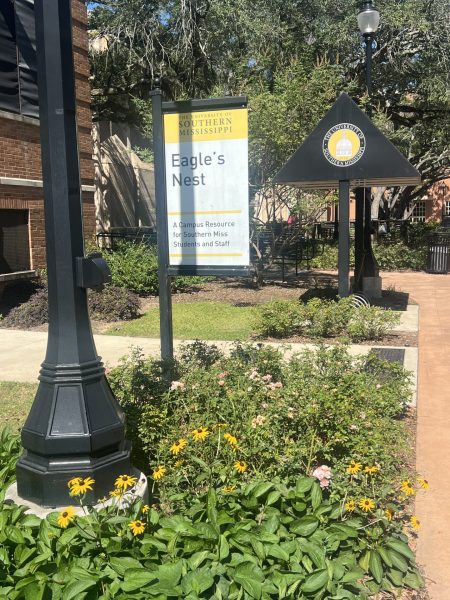“More than my disability”
A journey focusing on the lives of disabled students on and around USM’s campus
Matthew Lee
Matthew Lee is thinking about what’s next for him beyond graduation. Opportunities in-state and as far away as Denver, Colorado, are on the table.
These opportunities came from networking and prior experience, but not in the usual sense for an undergrad. The senior sound and recording arts major’s connections began from a career that started about 30 years ago.
The Bay St. Louis native started college at the University of Southern Mississippi in 2022, 30 years after starting at Mississippi Gulf Coast Community College.
Lee has been visually impaired since he was born in 1974. When he went to MGCCC in 1992, the lack of resources and abundance of harassment led to him dropping out.
“The reason I hated school at a younger age is just kids are horrible, you know what I mean? And junior college when I first went in was like 13th grade,” Lee said. “So, you know, there was still heckling and harassment.”
Larensy Rogers is the is a senior PR and advertising major at USM. Though much younger than Lee, she has extensive life experience of her own.
She’s led talks with the FBI, served as president of the student chapter of a national organization, and served as a Keynote speaker for her own high school.
All while having optic nerve hypoplasia, which affects her eyesight.
This condition served as a launching board for her advocacy for blind Mississippians and Americans. It led to her becoming the president of the student division of the National Federation of the Blind.
Originally from Natchez, she found her second home in Jackson at the Mississippi School for the Blind. She went there from kindergarten to her senior year of high school. When she came to USM, it, too, felt like home. The university offered her the resources and support she needed to succeed at USM.
”I had spoken with ODA, and I was told that they were pretty decent. But I really, really found out how good the disability office was when I got here, and I needed help, and they were very helpful in assisting me and making sure I got everything I needed,” Rogers said.
Rogers and Lee are involved on USM’s campus and even have jobs within Southern Miss Student Media. Rogers is the advertising sales manager for SM2, and Lee is an audio engineer for WUSM, USM’s radio station.
Both note feeling supported by those around them within the School of Media and Communication but admit that some things around USM’s campus could improve.
During her interview, Rogers walked to the front steps of The Hub on USM’s campus to showcase how leaving and entering the building is difficult for visually impaired people.
“A lot of steps have different brick colorings, or the end of them will look a little different, but those look exactly the same,” Rogers said. “So, it’s very hard to tell the difference in those stairs.”
A particular classroom within College Hall poses a challenge for Lee.
“The monitors were bolted to the tables, and they were too far away for me to see. So that’s why I have to drag my computer and my monitors and stuff and set it up every time I need to be in 205,” Lee said.
As she walked through the Hub’s front doors, Rogers went to the food court. Two restaurants -Chick-fil-A and Subway- are inside. Though Subway still has a traditional system for ordering, Chick-Fil-A adopted a kiosk setup for those to make orders in the food court. Rogers no longer goes to Chick-fil-A on campus because she cannot read the text on the kiosk’s tablet.
“I should be able to come here, maybe put a headphone jack in or push the button on the side of here or something to enlarge the font, so that I can use this kiosk like everyone else on campus,” Rogers said.
Rogers and Lee are just two of the nearly one thousand students registered with USM’s Student Accessibility Services, formerly known as the Office for Disability Accommodations. Since the start of the Coronavirus pandemic, student registration with the office has grown by roughly 400 students, about 75% since the start of 2020.
According to SAS Assistant Director Susie Murphy, people requesting accommodations for disabilities that aren’t as noticeable are the main reason why more people use SAS than ever before.
“The majority of students that register with us have some type of psychiatric impairment, you know, like depression, you know, anxiety, and that’s what we’ve seen an increase in so much since the covid pandemic,” Murphy said.
Dean of Students and Associate Vice President Sirena Cantrell also mirrors this sentiment.
“I think mental health disabilities have risen. And being able to get accommodations for anxiety, severe depression, PTSD, those types of things has really come out of covid,” Cantrell said.
Those with autism, like Emilee Flurry, are those with disabilities not as easy to notice. Flurry currently works as a barista at Java Moe’s in Hattiesburg.
“I’m grateful for what I am doing today, and I am also grateful for who I am today cause I’m learning self-love and self-acceptance for who I am. For my autism, my mental health, and everything that I am doing right now,” Flurry said.
Flurry is not a USM student, so a question remains: what resources can she and others outside of USM use? One such resource would be the Mississippi Department of Rehabilitation Services.
MDRS is a state agency that helps Mississippians with disabilities find jobs, live independently, and even support their education. MDRS helps over 20,000 Mississippians across the state. This is approximately 0.7% of the state population. In Forrest County alone, where USM is located, MDRS helps 796 people -more than one percent- of the county’s roughly 78,000 residents.
MDRS helps to support those like Flurry through job fairs, like the one that happened on campus through that office in April. The agency also helps students like Lee with the cost of college and makes sure he has the equipment he needs to succeed at USM.
“The school’s resources are limited, whereas the state’s resources are a little more. They have a little bit more ability to buy a $1,000 monitor, and a $3,000 Macbook, and a $5,000 magnifier, you know? I wouldn’t have been able to buy it, that’s for sure,” Lee said.
For Tiffany Parrish, who works within MDRS, the services Lee and others receive align with what the agency offers.
“We can help with different things such as paying college tuitions, help with computers. We work with all types of disabilities, too, and we can help once they graduate, help them find a career option,” Parrish said.
But despite the support and resources available, anxiety about the future resonates in both Lee’s and Roger’s minds.
“Why would you hire somebody that takes six hours to do the same thing that could really be done in 30 minutes by someone else? So, you really have to sell yourself in other ways that would make an employer want to hire you,” Rogers said. “It’s a scary thought, but it’s true.”
But a mentor from grade school, LaShawna Fant, is a powerful reminder of what Larensy Rogers can do. That mentor is completely blind. She lost 95 percent of her eyesight during her senior year of high school. Despite that, she earned an associate’s, bachelor’s, master’s, and Ph.D. from colleges and universities across the magnolia state. Fant even writes children’s books.
Fant taught and counseled Rogers while she was a student at the Mississippi School for the Blind. She gave Rogers a profound sense of optimism about her future beyond high school and college.
“Just to see her be successful and to have her as a teacher really showed me that, ‘Yes, I can do this,’ you know?” Rogers said.
Growing up, Matthew Lee was insecure about his disability. His efforts in trying to hide it made him miserable. That, in turn, negatively affected his physical and mental health. The reason why he went back to school was to show future employers that he is qualified and that his visual impairment would not stop him from doing his job.
“I’m punctual. I don’t call in sick unless it’s something really serious, you know? I’m not late. If I am, you know about it way ahead of time.” Lee said. “I just want to be known as a good hard worker that put in his share, you know? I’m just having to go through a few extra hurdles to get to the point where I can do what I want to do and not end up at some job, some crummy job that I don’t want to do just because I have to eat.”
He eventually got to the point in his life where he stopped worrying about his disability. His newfound confidence was mainly bolstered by helping his Bay St. Louis community during Hurricane Katrina.
“I was in the Boy Scouts for like 10 years. And my skill level was far beyond almost everyone else that was stuck in the same disaster as me. They couldn’t make a fire, they didn’t know how to purify water, they didn’t know how to scavenge for materials, and [know] what was okay to eat, what wasn’t. And I got a lot of self-worth from that,” Lee said.
Despite the mission and advocacy of campus, state, and national resources, stigma towards those with disabilities still exists. But the biggest challenge for many is being seen as a person, not just by their disability.
People like Larensy Rogers want to be seen for the value she adds, not for the services she needs.
“They probably at first just saw me as a person with a disability, maybe or maybe not, I can’t get in their heads,” Rogers said. “But they’ve begin to like me for me. I hang out with them, we do things together. If I need help, they don’t mind assisting me when I do, cause we all need help, no matter if you have a disability or not.”
In grade school, Emilee Flurry was bullied for being autistic. She wants to be valued by others for who she is.
“Hopefully, once they get to meet me or know me around the campus, they’ll probably understand, and I’ll share them my story for who I am. And I would love to get to know them for who I am,” Flurry said.
People like Matthew Lee have a sense of humor. He would just rather have someone to laugh with than be laughed at.
“You know, like I like a good blind joke just like anybody else, but it better be good,” Lee said.
Your donation will support the student journalists of University of Southern Mississipi. Your contribution will allow us to purchase equipment and cover our annual website hosting costs.






















